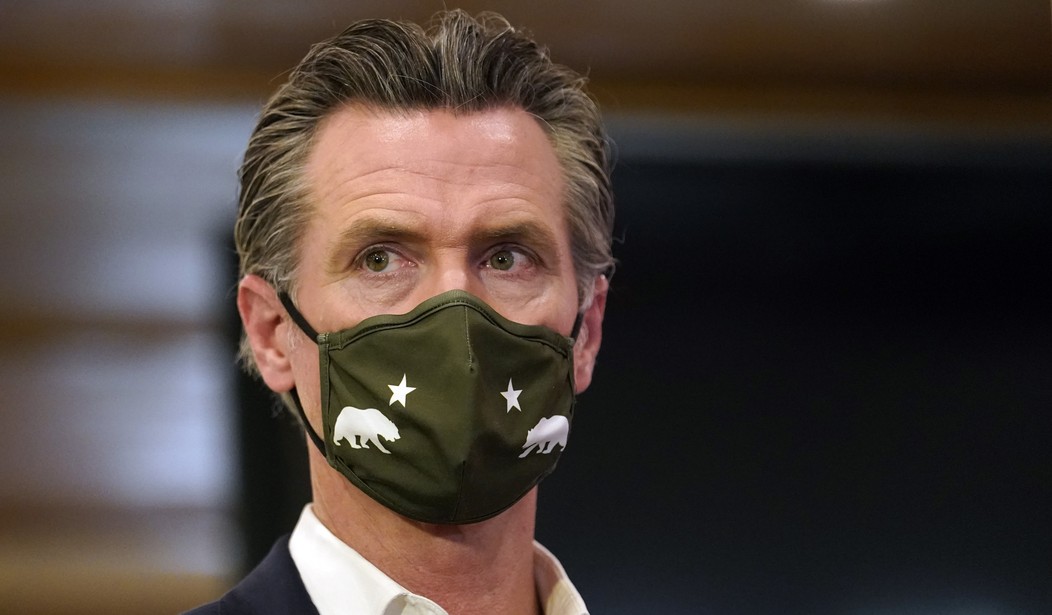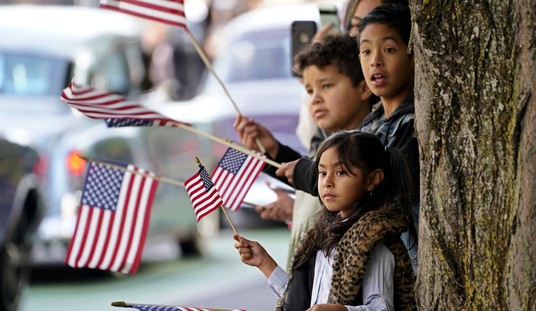Hey, nothing says normalcy like more government marketplace interventions, right? California voters will finish going to the polls tomorrow in the state’s open primaries. Will a new push for mask mandates in the pandemic force those voters to choose between yet another season of pointless performative acts or more rational leadership?
Yeah, yeah, yeah … it’s California, I know. But still:
Suddenly, California officials are moving toward new indoor mask rules as coronavirus cases enter the danger zone in many parts of the state.
The virus has been spreading rapidly across California after a spring of big declines. That is setting up an anxious summer in which officials are now talking about a return to mask wearing to prevent wider spread.
So far, the biggest concerns have been in Northern California. But Los Angeles County officials say mask mandates are possible by the end of the month if conditions continue to deteriorate.
The U.S. Centers for Disease Control and Prevention recommends universal indoor masking when a county enters the high COVID-19 community level, the worst in a three-tier system.
Entering the high COVID-19 community level means that new weekly rates of hospitalizations, or hospital capacity, are being affected by coronavirus-positive patients to such an extent that the hospital systems may grow strained.
“Deteriorate” is a loaded word here. Cases may be escalating again thanks to super-transmissive variants, but there isn’t any indication that it’s overtaxing health-care resources. The LA Times reports that hospitalization admissions are up in California, but by how much? Not much at all, even according to the CDC’s own data today:

The seven-day average of hospital admissions has tripled since the mid-April trough, it’s true — but it’s still far below the Omicron peak of January. And that doesn’t account for the fact that almost all of these admissions are correlative to COVID-19 diagnoses, not causative. With Omicron and other super-transmissible variants, people who are admitted for other reasons get counted as admissions for this metric, even if their COVID diagnosis has nothing to do with their treatment.
In other words, this metric is meaningless in an environment where variants are much less likely to cause severe outcomes and where most adults have been vaccinated and/or have access to therapeutics. This metric and the measure of correlated deaths will remain useless until the CDC finally fixes its data to track admissions and deaths that are caused by COVID-19.
Next, let’s remember that many states, especially warm-weather states, haven’t had mask mandates since late 2020. The differences in outcomes in those states has been statistically insignificant from those with mandates in place, meaning that mask mandates do not work in practice to hold down community transmission. The New York Times’ David Leonhardt made that clear last week:
In U.S. cities where mask use has been more common, Covid has spread at a similar rate as in mask-resistant cities. Mask mandates in schools also seem to have done little to reduce the spread. Hong Kong, despite almost universal mask-wearing, recently endured one of the world’s worst Covid outbreaks. …
During an acute crisis — such as the early months of Covid, when masks were one of the few available forms of protection — strict guidelines can nonetheless make sense. Public health officials can urge people to wear tightfitting, high-quality masks and almost never take them off in public. If the mandate has even a modest benefit, it can be worth it.
And even without that point, the time has passed on mask mandates for another reason:
The available data also suggests that more than half of Americans have had Covid in the past six months, making many of them unlikely to contract it again now. As Jennifer Nuzzo, an epidemiologist at Brown University, told Vox: “Many of the people who are not wearing masks have already had Covid, so they’re like, ‘I’ve been vaccinated, I already had it — how much longer do you want me to do this for?’ And it’s kind of hard to say, ‘No, you absolutely must wear it.’”
Policymakers in California may want to force people to comply, but it’s become clear that voters have had enough. Americans have incorporated the measured risks of further COVID-19 exposure, The Hill reports, and they’re done with the government mandates:
Now, almost all masks or vaccine requirements have been deliberately abandoned or overturned in court. The U.S. is averaging about 100,000 new cases every day, but movie studios are releasing summer blockbusters to packed theaters, families are celebrating weddings, and bars and restaurants are full.
Living with the threat of a COVID-19 infection has become the new normal for Americans who are ready to move on.
“People are tired of the changes that they’ve had to make to their lives related to COVID-19 and so eager to get back to normal,” said Mercedes Carnethon, epidemiologist at the Northwestern University Feinberg School of Medicine.
“And what they’ve seen with increased experience, two plus years into the pandemic is that, if they know people who’ve had COVID-19, most of them—and this ignores a million people who have died—but most of them have recovered,” Carnethon said.
That is almost certainly true in California, and maybe especially so. For one thing, they’ve endured mandates for much longer than most of the rest of the country. For another, Gavin Newsom turned out to be a masking/social distancing hypocrite on more than one occasion. It’s at least somewhat surprising that the state is making it clear that they will put voters back through more mandates on the eve of the primary, and very surprising given the lack of impact from its previous mandates.
The rest of the country has moved on. Californians will have an opportunity tomorrow to declare whether they’re ready to do the same.









Join the conversation as a VIP Member